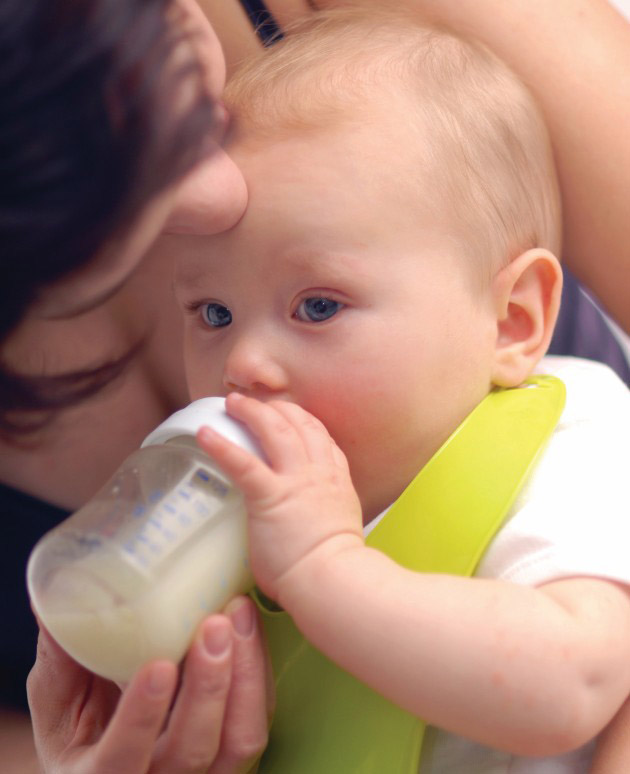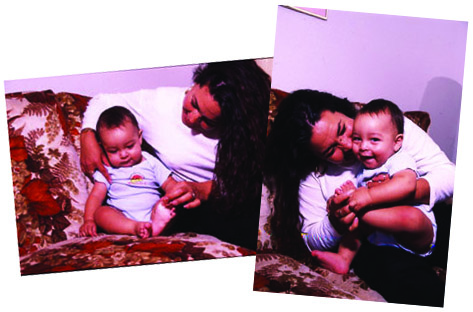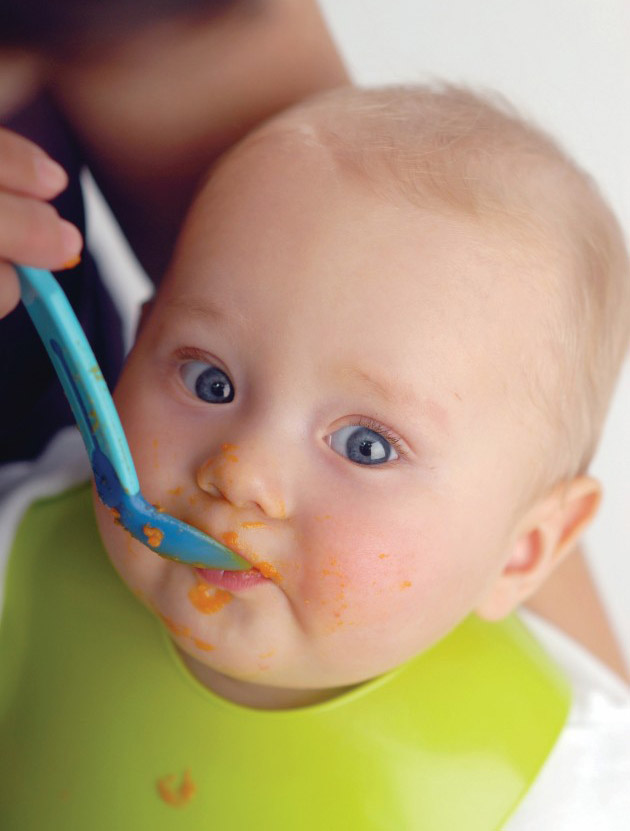1st Year
MONTH
8
1st Year – Month 8
This is the Age of Curiosity

Imagine That You Are 8 Months Old
You try to talk, but no one seems to understand your language. You try to walk, but you’re not quite sure how to do it yet. You reach out to touch things that are shiny, soft, hard, smooth, or sticky, but everyone tells you, “No, don’t touch.”
How would you feel? A little frustrated, you can bet! That’s how your baby feels at this age. They are very curious and wants to find out about all the fascinating things that are around them.
When you find yourself saying no, give your baby a one- or two-word reason. This helps them learn why they cannot do certain things. Tell your baby what you want them to do instead. Research shows that this really helps.
If you see your baby crawling toward your slippers, and you know they’ll go into their mouth, say, “Yucky” or “Tastes bad”. Give them something else to play with and say, “Let’s play with the teddy bear.”
If your baby tries to touch the hot oven, say “Hot,” and move them away from the stove.
As your baby gets older, you can make explanations a little longer — three or four words instead of one or two.
Your baby’s memory is not the same as yours. Remember how many tries it took them to learn pat-a-cake and peek-a-boo? You will have to tell your baby again and again how to behave and handle situations the way you want.
Show the world to them, lovingly and safely. Be your baby’s guide while they look at, explore, and satisfy their curiosity.
What’s It Like to Be 8 Months Old?

How I Grow and Talk
- I crawl backward and forward on my stomach.
- I pull myself up by holding onto furniture, but I have trouble getting back down.
- I stand up if I lean against something.
- I sit without support for several minutes. My neck and back are getting stronger, so I can sit up straighter now.
- I hold onto a toy, such as a rattle, for several minutes.
- I reach for things and hold them with my thumb and first and second fingers.
- I pick up small things, such as pieces of string.
- I let you know if I am happy, sad, or scared by the sounds that I make.
- I still babble a lot and shout to get your attention. I am now an “advanced” babbler, which means I’m making sounds in my family’s language. Spanish babies “speak” Spanish; Russian babies “babble” in Russian.
- I recognize some words.
- I watch and try to copy the way your mouth moves.
How I Understand and Feel
- I like to pat and kiss my reflection in the mirror.
- I turn and listen when I hear familiar sounds such as the telephone ringing or someone saying my name.
- I love to imitate people I know.
How I Respond
- I am very curious and want to explore everything. I empty drawers, tear magazines, and turn things topsy-turvy. Move everything that can harm me.
- I know how to solve simple problems, such as making a toy bell ring.
- I understand more of what you say. I know the meaning of “in” and “out.”
- I remember events that just happened.
- I like to look at pictures and have you name what’s in them.
- I am frightened by new events and new people.
- I am upset when you leave me, even if it’s for a short time.
- I feel so relieved when you return.
- I’m upset when people make a lot of fuss over me.
- I get frustrated or lose my temper when I can’t find something.
Some children do things earlier or later than described here. Most differences are normal. Focus on what your child can do and get excited about each new skill. If you notice that your child is lagging behind in one or more areas for several months, use this list to talk with your doctor about your child’s development.
Feeding Your Baby
 With patience, you can help your baby learn to like many different foods. Remember to start one new food at a time to be sure it doesn’t cause allergies. Your baby may have some teeth and may be ready to try fork-mashed vegetables and fruits. Mash a favorite vegetable thoroughly with a fork. You could also use a potato masher, blender, or food processor to mash ripe bananas, cooked apples, winter squash, sweet potatoes, and carrots.
With patience, you can help your baby learn to like many different foods. Remember to start one new food at a time to be sure it doesn’t cause allergies. Your baby may have some teeth and may be ready to try fork-mashed vegetables and fruits. Mash a favorite vegetable thoroughly with a fork. You could also use a potato masher, blender, or food processor to mash ripe bananas, cooked apples, winter squash, sweet potatoes, and carrots.
Make sure your baby’s food contains no lumps, pieces of skin, strings, or seeds. The mashed food can be a little thicker than pureed food. Cooked foods may be strained through a fine mesh sieve or strainer. A sieve can also be used to steam-cook small amounts of food for your baby. Press the food through the sieve or strainer. This gives the food a very soft consistency. Be sure that all food particles are removed when you wash the strainer.
Your baby will probably be eating:
- Breast milk and/or formula when hungry, about 30 ounces a day
- Infant cereal mixed with liquid, 2 to 3 tablespoons twice a day
- Vegetables, pureed, 6 to 8 tablespoons daily, including green and yellow veggies
- Fruits, pureed, 2 to 4 tablespoons daily
Frequently Asked Question: Fear of Strangers
Question:
My baby has suddenly become scared and shy of strangers. They sometimes cry, even when my mother comes to visit. Why do they act this way? What can I do to help them overcome this fear?
Answer:
First of all, don’t worry. A fear of strangers at this age is normal. Babies are beginning to develop a sense of self and others — an important step in growing up. Your baby now knows the difference between close family members and strangers.
Sometimes your baby will just stare at new people, watching them closely. Other times, they will look at a new person, and then look away a few times before warming up and smiling.
Some babies howl or whimper with genuine fear. Others cling to their parent and refuse to let go. Some babies, just like adults, develop an instant dislike for a person.
Usually, your baby is afraid of what the stranger does rather than who the person is. Try to see this from your baby’s point of view. You don’t want a stranger hugging you, and neither does your baby. So, don’t just hand them to someone they don’t know well. Hold them while they get to know the person. Have the new person smile and talk to them, and perhaps offer a favorite toy.
Let your baby make new friends at their own pace.
However they react; comfort your baby if they are fearful of strangers. Hold them close to you and let them know that they are safe.
Tell friends or relatives not to take it personally that your baby needs time to get used to people. Ask them not to rush up to them or try to pick them up.
Grandparents or friends may have a hard time understanding why your baby gets upset when they pick them up. Assure them that it will be worth the effort to get acquainted slowly. As your baby gets older, they will feel more secure and more comfortable with other people.
Spanking Your Baby Doesn’t Work
 No baby should be spanked or slapped. Spanking a baby is dangerous. Many babies are injured this way. Family members may tell you to spank your baby so they won’t be spoiled and will know you’re the boss. This is not true.
No baby should be spanked or slapped. Spanking a baby is dangerous. Many babies are injured this way. Family members may tell you to spank your baby so they won’t be spoiled and will know you’re the boss. This is not true.
We are learning new things about babies all the time, including what discipline works best. So, the information in these newsletters might be different from what your parents or neighbors were told when their children were little.
Babies are too young to understand, so they don’t learn from spanking. It just makes a baby cry more, and it will make you feel bad. When your baby does something you don’t like, show them something else they can do instead. Show them a better way.
Your baby may upset you by waking you up at night, crying a lot, or messing a diaper just as you put it on. Remember: Your baby doesn’t do this on purpose to make you mad. Your baby doesn’t think that way. They can’t help it, so it doesn’t help for you to get angry.
What can you do?
- Call a friend and ask what they would do.
- Ask someone to watch your baby while you get some fresh air. You may come back with a new outlook on living with your baby.
Sleep Problems?
Many 8 month-olds have trouble settling down to sleep. They’re so excited about sitting, crawling and exploring that they don’t want to go to bed!
Here are some sleepy-time tips:
- Put your baby to bed at about the same time every night when they are drowsy, but awake.
- Spend time cuddling, reading, singing or talking to your baby.
- Help them slow down and relax with bath time, gentle massage and book reading.
Doing the same thing in the same way helps children settle down to sleep. Being sure your child gets plenty of cuddle time during the day will probably help them sleep better at night — according to recent studies.
If your baby cries after you’ve put them to bed, check on them, but keep the lights dim. If they are OK, pat their back for a minute or two, and leave.
If they continue to cry, check on them every few minutes until they fall asleep. Slowly increase the time between your checks. Try to be understanding, not angry.
Show them you are there for them, but that they must fall asleep on their own. If you are consistent, they will learn to sleep on their own by learning how to comfort themself.
Help Your Baby Learn to Problem Solve
Safety note: Remove the strings or ribbons from the toys when you and your baby finish your play session.
Tie string or ribbon, no longer than 6 inches, around some favorite toys. Place the toys out of reach and the string close to your baby. Pull the string to get the toy. Talk about what you did. “I pulled the string to get the keys.”
Put the keys back and see if your baby can pull the string to get the keys. This is a good high chair game if you tape the string to the high chair.
Tie strings, no longer than 6 inches, around other objects that are large, small, heavy, or light. Let your baby try to pull each one.
Place toys on a towel so your baby has to pull the towel to get the toys. Put toys in a box. Turn the box over. Does your baby lift the box off the toys?
Create simple problems for your baby to solve. Tell your baby how wonderful they are for solving the problem.

Play with Me: It Helps Me Learn
Watching and learning: Babies learn by imitation, copying what they see other people doing. You will see more of this in the months to come.
How big is baby? “So big!” At first you might need to gently show your baby how to raise their arms up over their head while you say, “So big!”
Hide and seek: Big brother or sister can hide nearby. You can say, “Where is _____? Your baby can help you try to find the person
who is hiding.
Hiding things: Let your baby watch you as you hide a small toy under a cloth or cup or in your pocket. Do they try to find it? If not, try covering only part of the toy.
Music fun: Your baby will enjoy listening to many kinds of music. Show your baby how to clap and move their body to the music. As your baby learns to stand and walk, those movements will turn into dancing.
Help Your Baby Have Safe, Healthy Food

DO NOT add salt, sugar, or seasonings to your baby’s foods. Foods that taste bland to an adult are a new taste experience to an infant. There is enough natural sodium in foods.
DO NOT feed honey to your baby during their first year. Honey may carry botulism spores that can make them sick.
DO NOT use leftovers to make baby foods. Leftover foods are likely to have more bacteria than freshly prepared foods. This could cause your baby to get food poisoning. Use fresh, frozen, or canned food. If you use frozen food, buy the one with the least amount of added sugar, salt, and fancy sauces. These are not good for your baby.
DO NOT feed your baby raw eggs or raw milk. Raw milk is milk that has not been pasteurized. These raw foods can be dangerous for them.
DO NOT feed your baby chunky foods such as corn, nuts, popcorn, and seeds, or coarse-textured foods (such as cookies) that crumble easily. Your baby could choke on these foods.
Beets, spinach, turnips, and collard greens contain too many nitrates for your baby. DO NOT feed them these foods yet. Commercially prepared baby food for these vegetables may be safe, but it’s best to avoid them right now.
DO NOT get your baby’s food too hot. Your baby’s mouth could be burned by hot food. If you want to warm your baby’s food, do it just before serving.
NEVER leave your baby alone while they’re eating. They may choke or try to climb out of their high chair.
How Are Things Working Out With Child Care?

Researchers have learned that babies who go to child care still bond most closely with their parents. Even so, it is better for babies to have the same caregiver every day.
Babies in high quality child care are just as smart as babies whose parents care for them at home. Unfortunately, some child care providers are not providing quality care.
It’s important for caregivers to like taking care of babies, to smile often, and to talk while dressing and feeding your baby.
Babies should be kept clean, dry, and comfortable. They need to hear gentle voices and cheerful sounds. They need to receive lots of praise.
Infants should have their own separate space for eating, sleeping, and playing. Centers with lots of infants should divide babies into smaller groups so they feel more secure. The environment should be bright and cheerful.
Cribs, high chairs, playpens, and toys should be clean and in uncrowded spaces.
Good caregivers wash hands carefully after diapering, dressing, and feeding each baby. They are careful that bottles and cups are not shared among babies.
Babies are moved to different play areas and given different toys so that they have lots of chances to move around and explore. They need time for peace and quiet too, but it’s not a good place if babies are kept in cribs or playpens for long stretches of time.
Your baby needs someone who respond to them quickly and gently, someone they can learn to trust.
Enough adults should be on hand to cuddle, play with, and hold the babies for bottle feeding, but they should not hold and carry the infants all day.
If you are not happy with the care your infant is receiving, it may be time to find another caregiver.
Variety is the spice of life, but babies need consistency. They like routines or doing the same things every day. If your baby has a bunch of child care providers, it may be hard to form close bonds. Your baby needs someone who responds to them quickly and gently, someone they can learn to trust.
Take Time for Yourself
There never seems to be enough time to do everything you feel you need to do. It is important to prioritize and do what must be done, which includes taking care of yourself.
Plan time for yourself. The fun and trials of having an 8 month-old in your life may cause you to feel tired at times.
Swapping baby sitting time with friends can be a way to arrange for some important get-away times for you.
Get enough sleep and exercise. It is part of taking good care of yourself so you feel rested and refreshed.
Reminders
Subscribe: If you are not already a subscriber, you can receive the newsletters direct to your email on your child’s birthday. Register at JITP.info (English) or (Spanish).
Every baby is unique: When reading this newsletter, remember: Every baby is different. Babies may do things earlier or later than described here.
Updates: We are constantly reviewing and updating JITP.info. See our current plans on the About Us page. Do you have questions or corrections? Email us at contact@jitp.info.
Credits: This newsletter was reviewed and updated in 2020 by YaeBin Kim and Dan Weigel (University of Nevada-Reno) and Anne Clarkson (Wisconsin-Madison Extension).